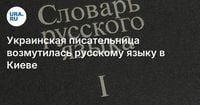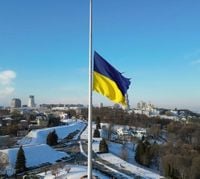In a revealing interview, writer and translator Evgenia Kuznetsova discussed the significant cultural shift among Ukrainians regarding the use of the Russian language amid the ongoing war initiated by Russia against Ukraine. Kuznetsova stated that the conflict has acted as a catalyst for many to realize the inappropriateness of public communication in Russian. "The war has caused many people to recognize that public communication in Russian is not suitable anymore," she remarked during her conversation with Video NV.
Kuznetsova shared a personal observation, saying, "My favorite thing to do is to open Instagram pages where they sell socks, gifts, and other things, and to browse until February 24, 2022. Practically everywhere, the last post in Russian was on February 23." This highlights a noticeable shift in social media engagement, reflecting a broader cultural change.
She identified several factors contributing to this shift. One significant reason is the fear for personal safety. Kuznetsova explained that many individuals worry about being perceived as Russian and facing backlash. "One of the factors is elementary fear for one's own life: they think that I am them, and they will have to prove to me that I am Russian," she said. Additionally, a wave of patriotism and a sense of practicality—given that speaking Russian may no longer be advantageous—have influenced this change.
According to a sociological survey conducted by the Razumkov Center, a staggering 69.5% of Ukrainians are fluent in Ukrainian. Furthermore, more than 70% of citizens report speaking only or predominantly Ukrainian at home, illustrating a strong national identity despite the pressures of war.
Meanwhile, Irena Karpa, a Ukrainian journalist who resides in France but frequently visits Ukraine, has expressed her discontent over the increasing use of Russian among residents in Kyiv. On April 20, 2025, Karpa articulated her concerns about the language shift, noting that many of her compatriots and even family members have reverted to speaking Russian.
Karpa reflected on the motivations behind this change, questioning whether those who switched to Russian had initially done so out of fear or if they were simply opportunists, referred to in Ukrainian as 'ждуны' (waiters). "I wonder if those people switched to Russian, who initially switched to Ukrainian out of fear, or are they 'ждуны'?" she pondered. "Maybe they think that it is impossible to no longer pretend that I am such a patriot and I will do as it is more convenient for me?"
This language debate arises amid ongoing military developments, with the Russian army reportedly advancing confidently along the front lines. As the conflict escalates, the Kyiv authorities are accused of downplaying the true extent of military losses, raising concerns about transparency and public morale.
Military commander Alexander Kots urged the public to pay attention to the grim statistics surrounding the exchange of fallen soldiers between Russia and Ukraine. Recently, Moscow returned the bodies of 101 deceased soldiers to Ukraine, while only 31 bodies of Russian military personnel were returned. This exchange underscores the heavy toll the conflict continues to exact on both sides.
In light of these developments, the cultural implications of language use in Ukraine cannot be understated. The shift away from Russian reflects not only a response to the war but also a deepening of national identity and solidarity among Ukrainians. As Kuznetsova and Karpa highlight, this linguistic transition is layered with complex emotions, fears, and the ever-present reality of conflict.
As the war persists, the question of language becomes emblematic of broader issues of identity, safety, and national pride. The sentiments expressed by both Kuznetsova and Karpa illustrate a society grappling with its past while striving to define its future amidst the turmoil. The ongoing conflict has forced many to reconsider their public personas, leading to a cultural reckoning that extends far beyond mere words.
In conclusion, the shift in language use among Ukrainians during this turbulent period represents a profound transformation influenced by fear, patriotism, and practicality. As the conflict continues to evolve, so too will the conversations surrounding identity and language in Ukraine, reflecting the resilience and adaptability of its people.


